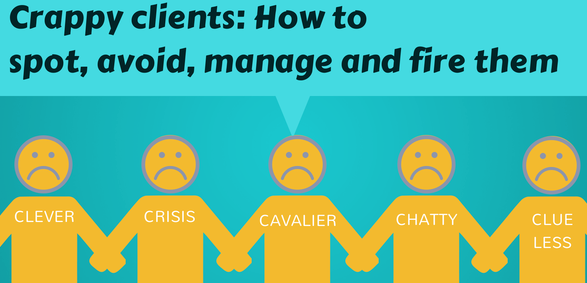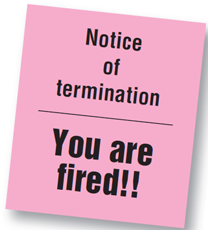

How to Fire a Client
| |
There is perhaps nothing more unpleasant than firing someone, yet you can't make a business case for keeping an employee on board if that person isn't doing his or her job. At the end of the day, the company – and most likely the employee – will be better off if he or she is someplace else.
We're all conditioned to this scenario in the workplace and most of us have had many years of experience reacting to someone being fired. Why is it so hard, then, when you have to fire a client?
Severing the relationship between you and your client is even more difficult when you like the client. Nine times out of 10, unless your client commits a crime, there's really no reason why you should fire a client, right?
Wrong. Once you look at what a problem-client is costing you in terms of money and resources, not to mention stress and angst, there are probably more reasons for letting a client go than there are for keeping that client. Nevertheless, some thought must be given to the "why" and "how."
Three Primary Reasons to Fire a Client
There may be more than just three reasons to sever the provider/client relationship, but through my years of work with accountants, it boils down to percentages, unethical behavior and lack of interest.
- The client takes up too much non-billable time. By far, this is the number one reason to let a client walk. Most of us have heard of the 80/20 rule in which we spend 80% of our time on the bottom 20% of our client base. To put it another way, the time you're spending with a client often monopolizes your non-billable time. Sure, you could make it clear that you are going to bill the client for each and every phone conversation, e-mail exchange, text (yes, even texting) and other interactions, but that isn't really realistic. These kinds of clients aren't adding to your bottom line, and without fail, you will come to resent the time the client is taking up. In a profession where it's sometimes hard to measure a return on investment, you definitely can determine if the time you spend with a client isn't adding to your bottom line. As a result, it's far better to get rid of the bottom 20% of your clients so you can focus on the remaining clients who will generate more revenue – and bring you more referrals.
- The client withholds information or wants you to do something unethical. If you find your client is not being honest with you about a particular situation or withholding valuable information that enables you to do your work in the most ethical, legal manner possible, it's time to part ways. Asking for a questionable deduction on a tax return is one thing, but hiding assets without your knowledge, for example, is another matter. You cannot afford to damage your reputation when a client who has the potential to do harm to himself, and in turn, to your practice.
- The client does not want to be helped. As odd as this might sound, we've all had clients who did not want to be helped. The client did not want your professional counsel and expert assistance, and will neither accept your advice nor respect your intentions. It's time to find clients who will benefit from your professional experience and knowledge. You'll feel much better about your business acumen, not to mention the inherently altruistic factor of helping someone solve a problem.
Giving the Pink Slip

In 2006, Radio Shack made headlines when it relieved 400 employees of their jobs – not for the fact that they were let go, but because they were told by e-mail.
While that is an extreme example, it's also illustrative of today's always-on culture where text and e-mail are the de facto methods of communication. Don't let this happen to you; as unpleasant as it may seem, it's far better to have a conversation than it is to send someone a note. Yes, sometimes for legal reasons you have to send a letter instead of talking to the client. That's fine, but unless you are legally prevented from talking with the person, send the letter after you have had the initial conversation.
Looking at the three primary reasons above, it's easy to see why you would want to fire a client, but one of the main traits we have as human beings is we tend to like each other. For example, you may have a client who will literally give you the shirt off his back if you ask him for it, but you need to separate your personal feelings from your professional beliefs. After all, you may see the client in social situations at Rotary, the Lion's Club or some other venue. What are you going to say to the fired client the next time you see each other?
The best way to move on is to have a professional conversation with the client and explain the reasons why. Just as you owe it to a fired employee to provide concrete examples of how he or she wasn't doing the job up to standards, you must do the same with a fired client. Explain in plain terms what the problem is, and once you have the conversation, follow it up with a letter, not an e-mail.
Unless there is a sudden ethical problem, the actual "firing" shouldn't be a surprise – and it may even be a relief. Whatever the outcome is, it's not going to be entirely pleasant, so the client's initial reaction may be anger. Reassure him or her that this is a completely private matter between the two of you and should remain so. You will not talk to anyone about this and you would appreciate it if the client would do the same.
Impact of Social Media
You don't want your conversation to be on Jerry Springer or making the headlines of the local paper, yet you have to protect your reputation, so be wary of the power of social media! Today, a negative blog or Twitter posting can go viral in a matter of moments; you will want to ensure you do not suffer any potential negative consequences.
This wouldn't happen to you … your "fired" client would never do this … well, wake up! No one can predict human behavior. While the client may seem well-adjusted when he or she leaves your office, it could be only minutes before something is posted that you cannot undo. You have to be realistic and cautious.
When your now-fired client says something negative on Yelp or Google reviews, you may have to get an attorney involved. However, watch your temper. It would be unprofessional of you to lash back and post a response or something you'll be sorry you said. Take the high road; the best stance is to do nothing. It's better to let the client stumble over his or her words than to react to them.
If it turns out that your colleagues and even your other clients are aware of the social media problem, it is time to communicate via letter or e-mail to them to allay their concerns. Don't reveal any information that can be used against you later on; an attorney can guide you through this difficult situation.
Your Practice is Changing – What Happens to Your Clients?
For various reasons, an accounting practice does change over time. You may find you want to devote your expertise to other kinds of specialty services or a niche industry rather than being a generalist. If this is the case, maybe you should consider selling a portion of your practice rather than severing the relationship. This enables you to offload the less desirable service to another accounting firm, and cash out.
Your practice may change for other reasons, too. For example, some accounting services generate a lower hourly fee realization. Rather than continuing to accept this, you may make the business decision to depart lower-margin types of services such as payroll and traditional write-up for something more lucrative.
If this happens, you may want to "package" up these clients and sell them to another practitioner or even selling them through a broker. Of course, people are not commodities, but this is business, after all. By selling them to another practitioner, the client still gets service and attention, and you can focus (or refocus) your practice on what you do best – and avoid firing the client!
Keep Calm and Carry On
We may have tax law and regulations that standardize the accounting profession, but practice management and human resource issues definitely are not cookie cutter. There is no manual or Dummies' guide that gives you all the answers.
As the British government imparted just before World War II, the best advice is to "Keep Calm and Carry on." Don't do anything rash. Think about what you want to do with a client before you take action. You can't get the client back once you've let him or her go, so be rational and sensible, but also be honest with yourself about the way you want to grow.
Fire a client for the right reasons. In the long run, you'll feel better about yourself and your business will prosper.



